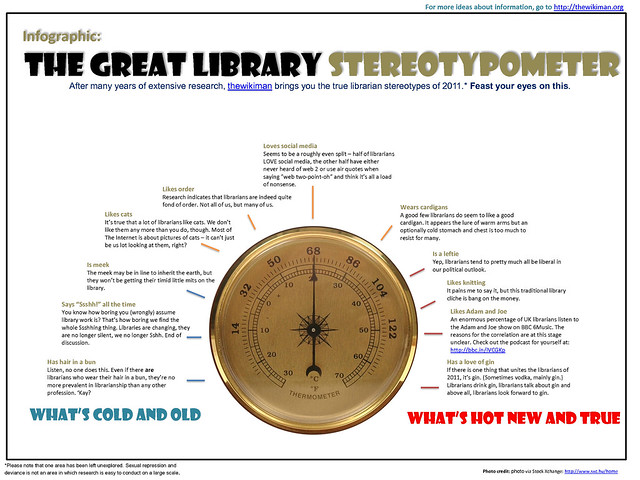I have a theory: I think the 2nd job you ever get in libraries is the most important. We’ll come on to the why in a minute – first of all I wanted to see if others’ experiences backed up my hypothesis. I put a poll on to Twitter, asking this: Which job was most significant in getting you to where you are in libraries now? Which most influenced you onto your current path?
I didn’t want to prejudice the outcome so I didn’t mention my theory. The results were interesting – they did seem to (just!) back me up:
Now, this is a very specific question. I’m not asking which factor is most significant to where people are now (a lot of people would say professional development outside of their 9-to-5 jobs, or their Masters perhaps) and I’m not asking which job is the most important in terms of people being in the information profession at all (presumably that’d be the first job for the vast majority of people) – it’s all about where you are, the path you’re on, the area of librarianship you’ve ended up in or the role you’re currently doing.
So I believe the 2nd job you ever get in libraries is arguably the most important because it dictates much SO of what happens to you afterwards. Obviously all jobs have an effect on what comes after them to some extent, but the 2nd job is something of a tipping point whose significance is, I’d imagine, not appreciated at the time most people are applying for it. Most people’s first library jobs fall into one of two categories – securing an entry-level position prior to doing the Masters (or becoming a graduate trainee), or securing an entry-level position because you’ve sort of stumbled into libraries accidently, and then finding it was a lot more interesting than you thought, so you stay in the sector. As has been discussed before, almost no first library jobs are beyond the entry-level – even people who have the Masters have to start at or near the bottom.
So – as a result of this, there’s not much proactive career choice about your first library job: you just need a job. Most people start as something like a ‘Library assistant’ – often a customer facing role, in the library itself, issuing books and helping with queries etc. You only really start to mould you career when you apply for that 2nd job – and my argument is that you need to make a really sound choice here, because it has a vital domino effect on your subsequent career. And actually, it’s tricky to divert off the path you choose for yourself at that 2nd job choice, because the 3rd job will (probably) be a higher up or better or related version of that 2nd job and (probably) pretty good, meaning you build a career off the back of it.
I’m obviously generalising here, and of course there will be exceptions – and throughout I’m imagining someone staying in more or less the same place, rather than having accrued several jobs at the same level on their CV simply because they’ve relocated a few times. But generally speaking, if you’re in that position that so many of us were in – you’re in your first library role, thinking it’s actually pretty good, wondering about making it into a career – you need to think carefully about the path you choose and, not least, how long that path is in reality.
I’ll take the academic library as an example, because that’s what I know best. Your first role was in Lending Services on the desk, so where do you go next? If you choose to stay in Customer Services then you’re looking at a Reference / Enquiries Desk role perhaps, otherwise there’s a big jump up to something like Customer Services Manager or Site Manager. If you go into the cataloguing side of things you could go for an Assistant Cataloguer post. You could try and move towards the subject librarian side of things by going for a Team Assistant post in an academic librarian subject team. Or there might be a ‘Digital Library Assistant’ type role, to do with digitisation or e-Resources. Whichever of these you choose, your 3rd job will probably also be in this area, is my point. And your 4th job too, perhaps. Of course people change all the time, but it’s quicker to develop a career in a roughly straight line. (I know this, because I didn’t - and have only in the last few months arrived at the job I actually wanted to do all along, and have much younger colleagues who took a more direct route…)
Part of the reason I’m writing this is because I know some people who’ve been working in libraries a good while, and are just sort of treading water – because that second job took them down a path, and now that path is blocked for whatever reason. There just aren't any more senior jobs than they're already doing, in the area they've come to specialise in. So I’d recommend getting hold of one of those organisational structure charts for your library (or the library you’d like to work in) and literally plotting your ideal route upwards, seeing what’s feasible, where the obstacles are, when you’d be waiting an age for people to retire or leave, etc. Some paths have very few destinations so are more competitive. Some might not even exist by the time you get to the good bit. Some paths might look like their beyond you in terms of expertise, but actually you could get there over time. Some paths have loads of destinations but aren’t well paid. Money certainly isn’t everything, but progression means a lot – you don’t want to get stuck in a rut.
It would be nice just to live in the moment, just to ‘be’ and not worry about all this stuff. But librarianship is a hugely competitive profession, with far more qualified librarians than there are jobs for qualified librarians. So it’s really never too early to be thinking about the career path you’re embarking upon – ideally, you need to start making informed choices almost from the very start.
If you’ve made it through all that - do you agree with my 2nd Job Hypothesis?
- thewikiman



 I'm ensconced in the
I'm ensconced in the